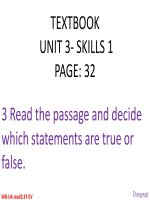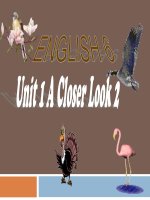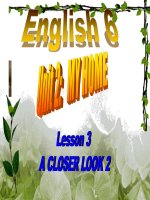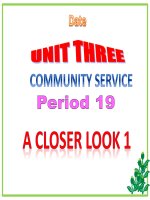Unit 11 3 our greener world lesson 3 a closer look 2 kho tài liệu học tiếng anh
Bạn đang xem bản rút gọn của tài liệu. Xem và tải ngay bản đầy đủ của tài liệu tại đây (256 KB, 36 trang )
Tuesday, August 22, 2017
Game: Pelmanism
Match a verb with a noun.
PROTECT
BROKEN
GLASS
RUBBISH
WE
PRODUCE
REDUCE,
REUSE,
RECYCLE
RECYCLE
REUSE
REDUCE
THE
ENVIRONMENT
USE
OLD
BOTTLES
RENEWABLE
ENERGY
3 Rs
NEW LESSON
Conditional sentences - type 1
1. Listen again to part of the conversation from
Getting Started. Pay attention to the conditional
sentences - type 1.
Nick: Yes, I do. It’s better than a plastic one because
it’s made of natural materials. If we all use this
kind of bag, we’ll help the environment.
Mi:
I see. I’ll buy a bag for my mum. Where can I
buy it?
Nick: They sell a lot of these bags at the check-out.
Mi:
Thanks. Are they expensive?
Nick: Not at all. By the way, you’re also 'green'.
You’re cycling.
Mi:
You’re right. If more people cycle, there will be
less air pollution. Right?
Conditional sentences - type 1
Conditional sentences - type 1
2. Write the correct form of each verb in brackets.
1. If it (be) _____ sunny next week, we (plant)
_________ the vegetables.
2. If we (recycle) _______ more, we (help)
_________ our Earth.
3. We (save) ________ a lot of trees if we (not
waste) ___________ so much paper.
4. More people (have) __________ fresh water if
we only (use)________ the water we need.
5. If the river (not be) ________ dirty, there (be)
______ more fish.
2. Write the correct form of each verb in brackets.
1. If it (be) _____
is sunny next week, we (plant)
will plant the vegetables.
_________
2. If we (recycle) _______ more, we (help)
_________ our Earth.
3. We (save) ________ a lot of trees if we (not
waste) ___________ so much paper.
4. More people (have) __________ fresh water if
we only (use)________ the water we need.
5. If the river (not be) ________ dirty, there (be)
______ more fish.
2. Write the correct form of each verb in brackets.
1. If it (be) _____
is sunny next week, we (plant)
will plant the vegetables.
_________
recycle more, we (help)
2. If we (recycle) _______
_________
will help our Earth.
3. We (save) ________ a lot of trees if we (not
waste) ___________ so much paper.
4. More people (have) __________ fresh water if
we only (use)________ the water we need.
5. If the river (not be) ________ dirty, there (be)
______ more fish.
2. Write the correct form of each verb in brackets.
1. If it (be) _____
is sunny next week, we (plant)
will plant the vegetables.
_________
recycle more, we (help)
2. If we (recycle) _______
_________
will help our Earth.
3. We (save) will
________
save a lot of trees if we (not
waste) ___________
don’t waste so much paper.
4. More people (have) __________ fresh water if
we only (use)________ the water we need.
5. If the river (not be) ________ dirty, there (be)
______ more fish.
2. Write the correct form of each verb in brackets.
1. If it (be) _____
is sunny next week, we (plant)
will plant the vegetables.
_________
recycle more, we (help)
2. If we (recycle) _______
_________
will help our Earth.
3. We (save) will
________
save a lot of trees if we (not
waste) ___________
don’t waste so much paper.
4. More people (have) __________ fresh water if
we only (use)________ the water we need.
5. If the river (not be) ________ dirty, there (be)
______ more fish.
2. Write the correct form of each verb in brackets.
1. If it (be) _____
is sunny next week, we (plant)
will plant the vegetables.
_________
recycle more, we (help)
2. If we (recycle) _______
_________
will help our Earth.
3. We (save) will
________
save a lot of trees if we (not
waste) ___________
don’t waste so much paper.
4. More people (have) __________
will have fresh water if
we only (use)________
the water we need.
use
5. If the river (not be) ________ dirty, there (be)
______ more fish.
2. Write the correct form of each verb in brackets.
1. If it (be) _____
is sunny next week, we (plant)
will plant the vegetables.
_________
recycle more, we (help)
2. If we (recycle) _______
_________
will help our Earth.
3. We (save) will
________
save a lot of trees if we (not
waste) ___________
don’t waste so much paper.
4. More people (have) __________
will have fresh water if
we only (use)________
the water we need.
use
5. If the river (not be) ________
dirty, there (be)
isn’t
______
will
be more fish.
3. Match an if-clause in column A with a
suitable main clause in column B.
A
B
1. If people have a shower
instead of a bath,
a. you’ll remember the
answer.
2. If she likes this 'green'
shopping bag,
b. the air won’t be so
polluted.
3. If we plant more trees,
c. they will save a lot of
water.
4. If you are patient,
d. what will you do?
5. If you see someone throw
rubbish on the road,
e. I’ll buy one for her.
3. Match an if-clause in column A with a
suitable main clause in column B.
A
B
1. If people have a shower
instead of a bath,
a. you’ll remember the
answer.
2. If she likes this 'green'
shopping bag,
b. the air won’t be so
polluted.
3. If we plant more trees,
c. they will save a lot of
water.
4. If you are patient,
d. what will you do?
5. If you see someone throw
rubbish on the road,
e. I’ll buy one for her.
3. Match an if-clause in column A with a
suitable main clause in column B.
A
B
1. If people have a shower
instead of a bath,
a. you’ll remember the
answer.
2. If she likes this 'green'
shopping bag,
b. the air won’t be so
polluted.
3. If we plant more trees,
c. they will save a lot of
water.
4. If you are patient,
d. what will you do?
5. If you see someone throw
rubbish on the road,
e. I’ll buy one for her.
3. Match an if-clause in column A with a
suitable main clause in column B.
A
B
1. If people have a shower
instead of a bath,
a. you’ll remember the
answer.
2. If she likes this 'green'
shopping bag,
b. the air won’t be so
polluted.
3. If we plant more trees,
c. they will save a lot of
water.
4. If you are patient,
d. what will you do?
5. If you see someone throw
rubbish on the road,
e. I’ll buy one for her.
3. Match an if-clause in column A with a
suitable main clause in column B.
A
B
1. If people have a shower
instead of a bath,
a. you’ll remember the
answer.
2. If she likes this 'green'
shopping bag,
b. the air won’t be so
polluted.
3. If we plant more trees,
c. they will save a lot of
water.
4. If you are patient,
d. what will you do?
5. If you see someone throw
rubbish on the road,
e. I’ll buy one for her.
3. Match an if-clause in column A with a
suitable main clause in column B.
A
B
1. If people have a shower
instead of a bath,
a. you’ll remember the
answer.
2. If she likes this 'green'
shopping bag,
b. the air won’t be so
polluted.
3. If we plant more trees,
c. they will save a lot of
water.
4. If you are patient,
d. what will you do?
5. If you see someone throw
rubbish on the road,
e. I’ll buy one for her.
4. Combine each pair of sentences below to make a
conditional sentence - type 1.
1. We pollute the air. We have breathing problems.
If we pollute the air, we will have breathing problems.
2. People pollute the water. A lot of fish die.
3. We cut down trees in the forest. There are more floods.
4. The soil is polluted. Plants die.
5. There is noise pollution. People and animals have
hearing problems.
4. Combine each pair of sentences below to make a
conditional sentence - type 1.
1. We pollute the air. We have breathing problems.
2. People pollute the water. A lot of fish die.
3. We cut down trees in the forest. There are more floods.
4. The soil is polluted. Plants die.
5. There is noise pollution. People and animals have
hearing problems.
4. Combine each pair of sentences below to make a
conditional sentence - type 1.
1. We pollute the air. We have breathing problems.
If we pollute the air, we will have breathing problems.
2. People pollute the water. A lot of fish die.
3. We cut down trees in the forest. There are more floods.
4. The soil is polluted. Plants die.
5. There is noise pollution. People and animals have
hearing problems.
4. Combine each pair of sentences below to make a
conditional sentence - type 1.
1. We pollute the air. We have breathing problems.
If we pollute the air, we will have breathing problems.
2. People pollute the water. A lot of fish die.
If people pollute the water, a lot of fish will die.
3. We cut down trees in the forest. There are more floods.
4. The soil is polluted. Plants die.
5. There is noise pollution. People and animals have
hearing problems.
4. Combine each pair of sentences below to make a
conditional sentence - type 1.
1. We pollute the air. We have breathing problems.
If we pollute the air, we will have breathing problems.
2. People pollute the water. A lot of fish die.
If people pollute the water, a lot of fish will die.
3. We cut down trees in the forest. There are more floods.
If we cut down trees in the forest, there will be more floods.
4. The soil is polluted. Plants die.
5. There is noise pollution. People and animals have
hearing problems.
4. Combine each pair of sentences below to make a
conditional sentence - type 1.
1. We pollute the air. We have breathing problems.
If we pollute the air, we will have breathing problems.
2. People pollute the water. A lot of fish die.
If people pollute the water, a lot of fish will die.
3. We cut down trees in the forest. There are more floods.
If we cut down trees in the forest, there will be more floods.
4. The soil is polluted. Plants die.
If the soil is polluted, plants will die.
5. There is noise pollution. People and animals have
hearing problems.









